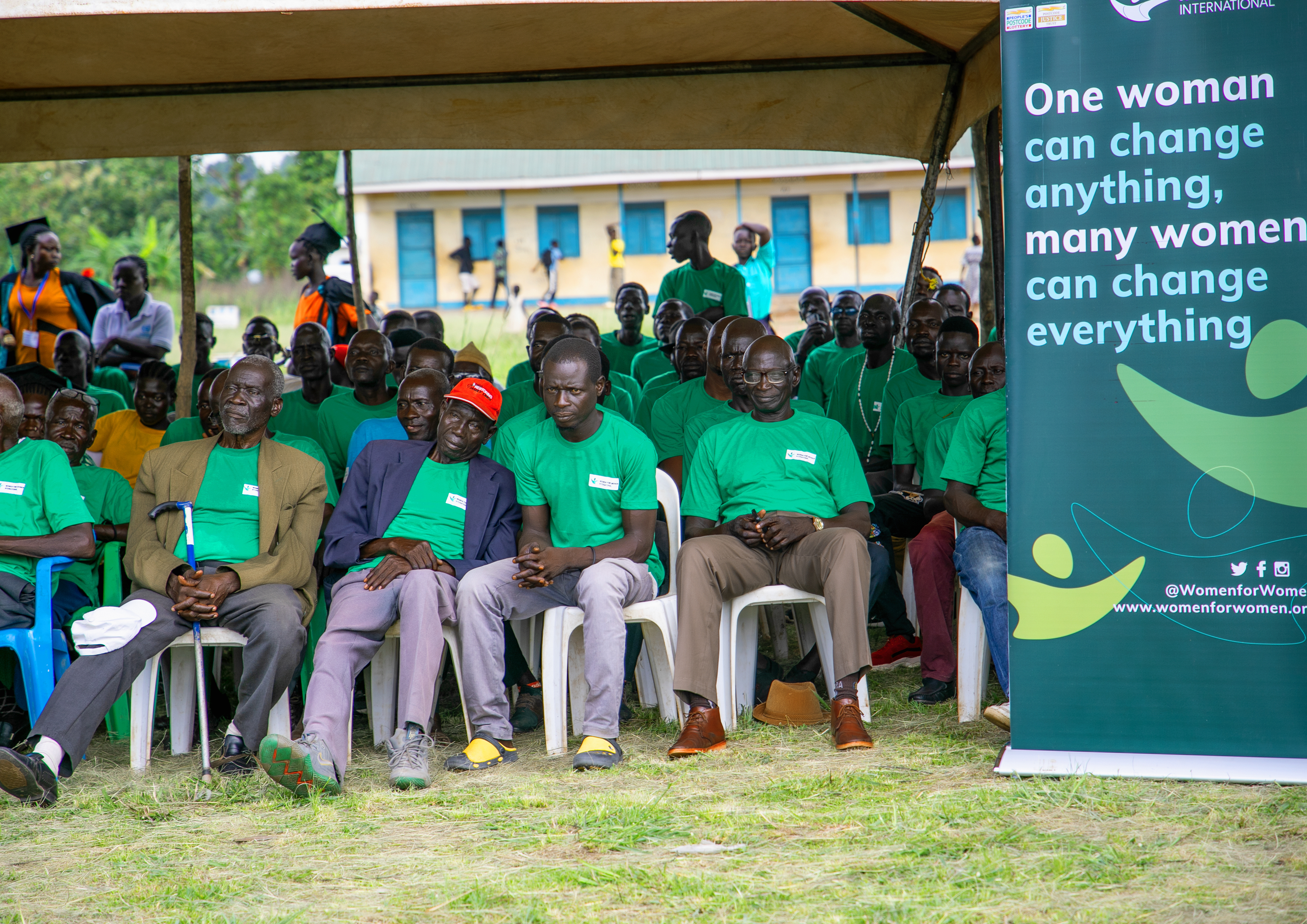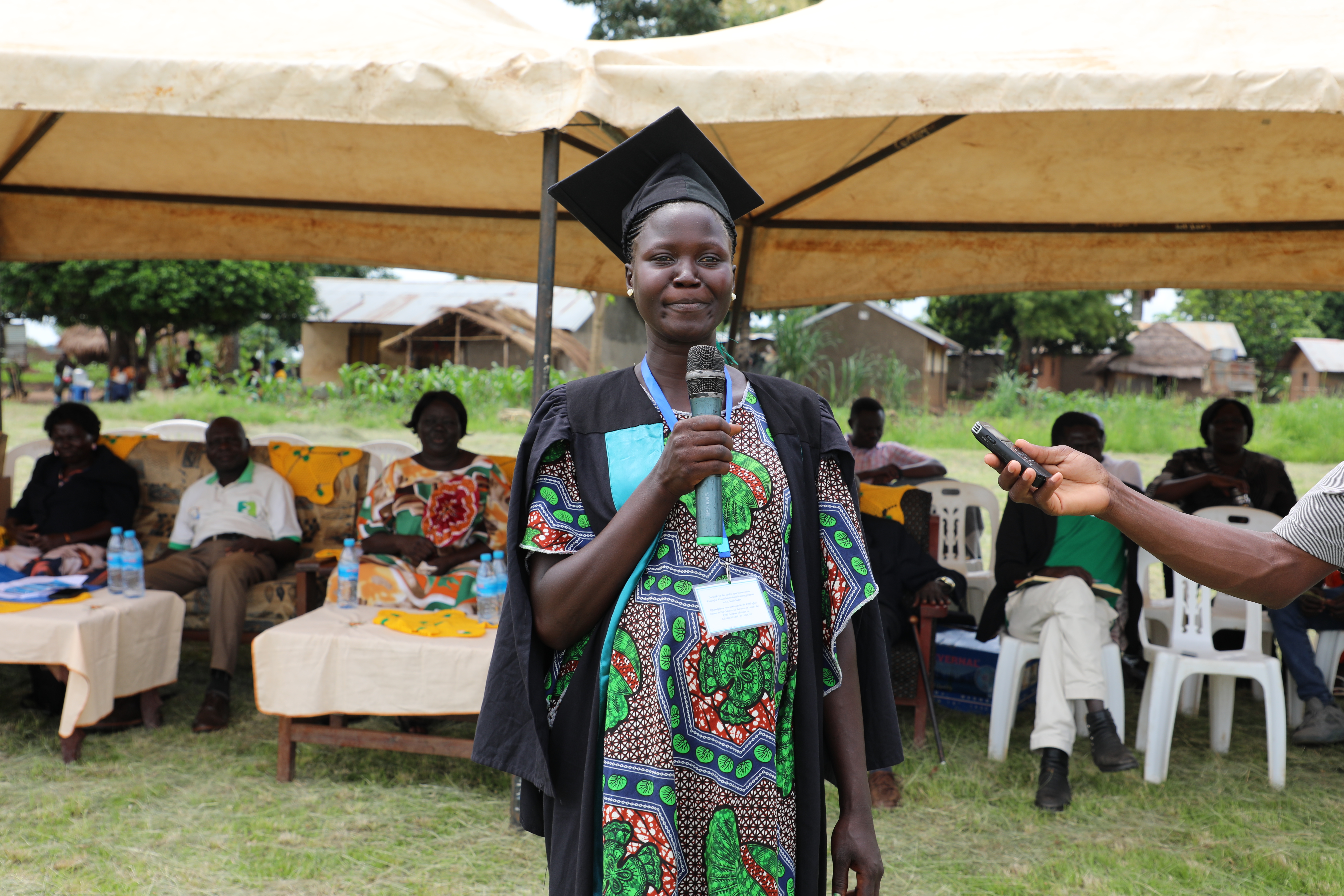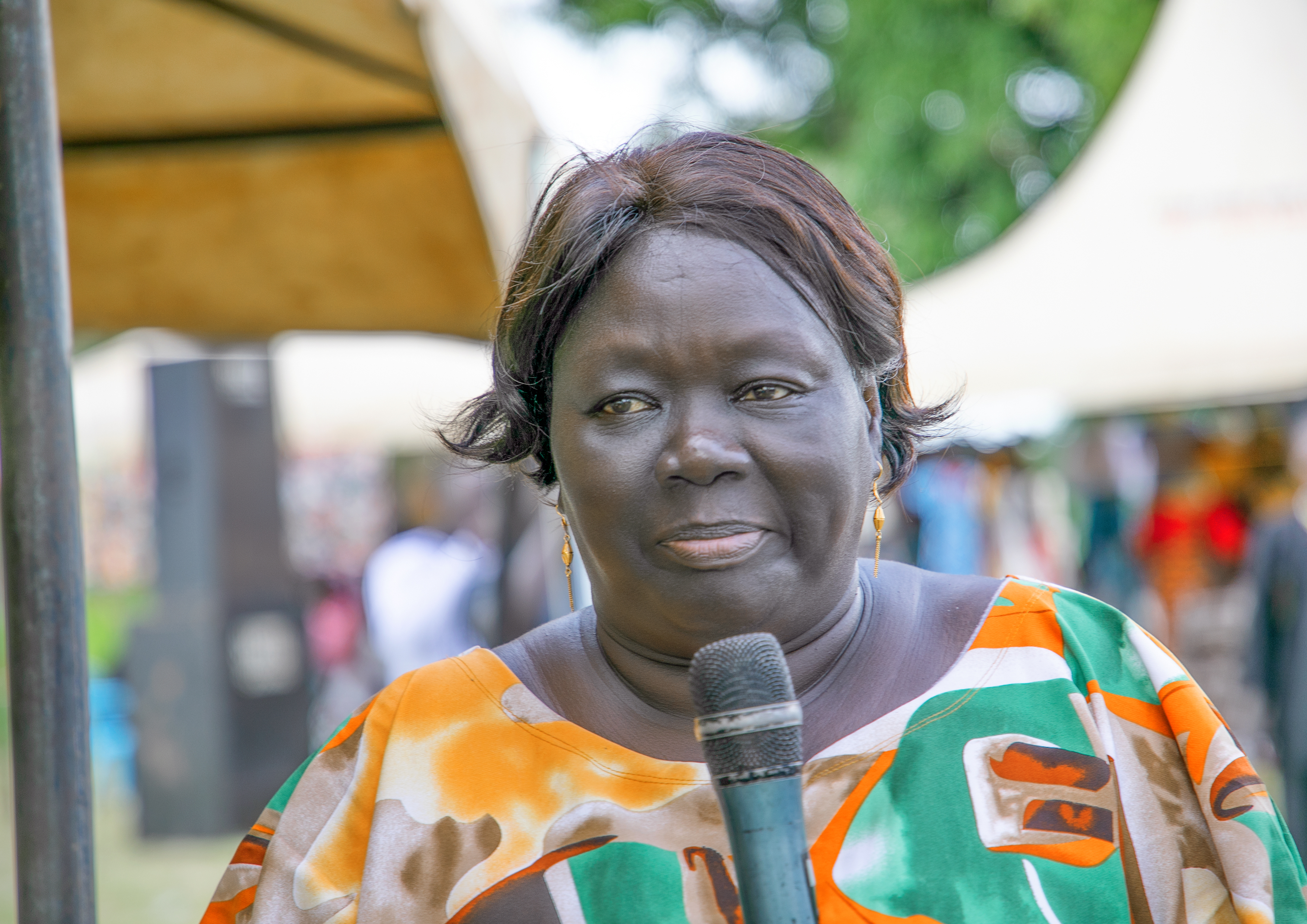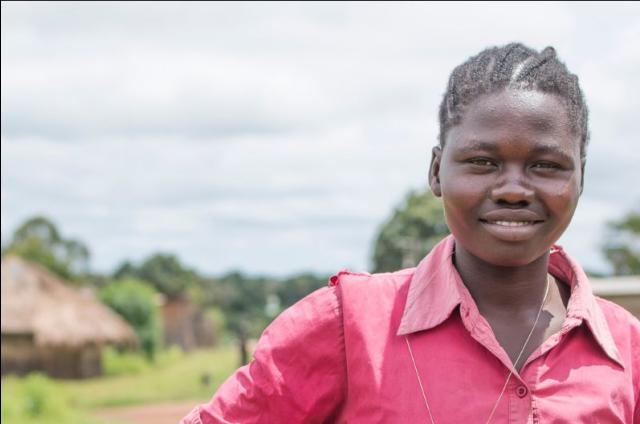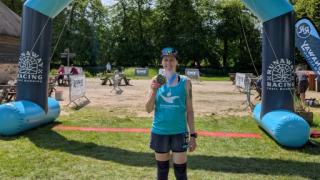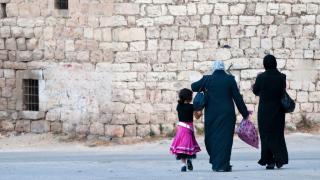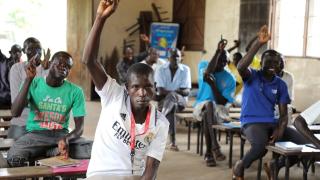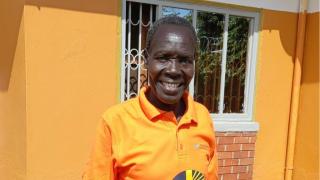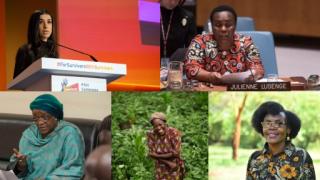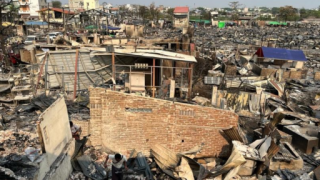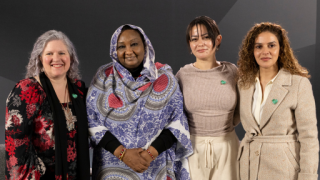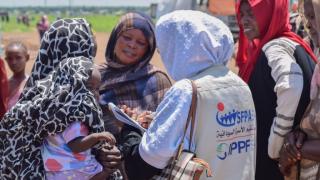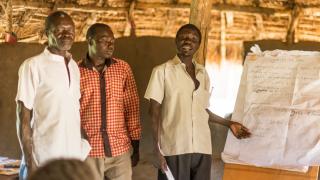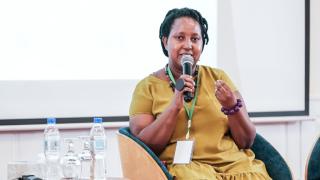Transforming Lives Together: Couples Connect in South Sudan
Transforming Lives Together: Couples Connect in South Sudan
Women for Women International is helping families transform their lives by fostering teamwork, financial independence and modern farming techniques - by piloting agricultural vocational training for couples
This innovative approach is part of our revised Men's Engagement Programme curriculum and encourages couples to work together, ensuring a better future for their families.
Here’s how the Couples Connect sessions are making a difference in Betty's life, and many others:
Betty's journey
moving forward after displacement
Displaced from her village during the 2016 crisis in South Sudan, Betty moved to the Ronyi Boma administrative division in Yei River County with her husband and their three children.
We lacked food, the children were constantly sick due to poor nutrition, and they often missed school.
To make ends meet, Betty borrowed money, sold firewood and opened a small restaurant. Farming, her true passion, was yielding little with her traditional methods due to the poor land conditions.
In March 2023, everything changed when Betty and joined our Stronger Women, Stronger Nations programme and participated in the pilot sessions for couples.
This pilot initiative aims to evaluate if couples' vocational training can lead to stronger economic outcomes for women compared to women-only vocational training. In addition to the standard agricultural training, which includes modern farming methods, the couples’ training has been adapted to:
- Educate men and women together on how to think about gender-sensitive divisions of labour
- Promote the equitable management of resources
- Foster gender awareness and an understanding how an agricultural family business operates
Each participant received a monthly stipend, a grant upon graduation to start-up their agricultural business, and farming tools and seeds.
Betty’s story is a testament to the pilot's positive outcomes for women:
With the new farming skills acquired, my husband and I embarked on joint farming.
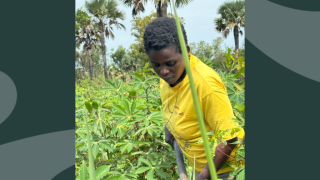
She continued, "He helped us get this large piece of land, and we applied all the new skills - from land preparation to harvesting and selling our products."
Today, my husband and I understand soil types, seasons and crop care. Our farm is thriving.
Betty's garden produce is sufficient to sustain her and her family, put her children through school and save for future needs.
She shared: "In my most recent harvest, I collected 4 basins of onions, 3 bags (50 kg) of peanuts, four basins of peas, and 4 bags of cassava. I am also now great at farm product business."
I would never have managed even half of this without the training and support from Women for Women International.
Changing Perspectives: A Husband’s Story
Engaging men in women's rights and power
For the men joining our Couples Connect vocational agricultural training, these sessions form part of a wider Men’s Engagement Programme curriculum, which is helping change patriarchal traditional norms and the perspectives of men in the community.
We spoke to Mawa, a programme participant, who joined our Couples Connect pilot sessions with his wife. He admitted that he had been a traditional, authoritarian husband, and that our programme helped him become a more supportive partner. As the training progressed, he began to appreciate his wife’s contributions and says he learnt the value of working together.
Today, my wife is the major breadwinner, and I support her in every way I can.
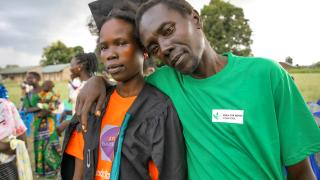
Mawa told us:
"In the programme, we learned about working together as a family, sharing responsibilities, communication in marriage, problem-solving and financial management.
Soon, I began to see reason in everything my wife was doing and I grew to appreciate her efforts in supporting me. Gradually, we started communicating again, and we would talk about business, farming and our family.
I started supporting her business, and we started working together."
Couples Connect Pilot: inital impact
more than training
The Couples Connect vocational training pilot, paired with our wider Stronger Women, Stronger Nations and Men's Engagement programming, appears to be leading to positive outcomes for couples in South Sudan.
We are in the process of conducting an internal evaluation that will be published later in the year to fully assess the success of the pilot approach. For the time being, this initiative is empowering couples to work together to:
- Enhance family unity: Couples learn to communicate effectively and share responsibilities, strengthening their family bonds.
- Promote financial independence: Participants gain financial management skills and receive grants to start or expand their businesses.
- Encourage modern farming techniques: Couples are trained in modern, practical farming methods to improve crop yields and food security.
- Foster community development: As families thrive, entire communities benefit from increased stability and economic growth.
Betty and Mawa’s stories highlight the impact of this new pilot in South Sudan.
Women for Women International is committed to engaging more couples in South Sudan and beyond. It is with thanks to our global community of supporters that this vital work is possible, helping families build a better future together.
keep reading
In May 2025, Natalie bravely took on an 86-mile ultramarathon in support of Women for Women International. In this blog, we learn about the importance of sisterhood, determination and strength, and how these can inspire us to support the women we serve.
To mark International Day for the Elimination of Sexual Violence in Conflict, we are amplifying the voices of women who are not just enduring the harsh realities of war and displacement - but who are also working every day to protect, support and empower others. Hear from two women in Palestine.
At Women for Women International, we count a number of dedicated and compassionate male staff among our global community working towards a more equitable future. I spoke to several of our male colleagues – from Iraq and South Sudan, to DRC and the UK. I asked what allyship means to them, how their work has shaped their understanding of gender justice, and what they’ve learned from the women in their lives. What emerged was not just a collection of stories, but a testament to the quiet, determined work of transformation – both personal and societal.
Florence Dumba is a social empowerment trainer at Women for Women International in South Sudan. Her work, working with survivors and creating safe spaces for women to heal from their trauma, is grounded in her own experience of being abducted twice.
In honour of the International Day for the Elimination of Sexual Violence in Conflict, we spotlight five extraordinary women leading the fight against this devastating form of violence. From Nobel laureates to grassroots activists, these changemakers are demanding justice, breaking silence and creating hope for survivors around the world.
On March 28, 2025, a powerful 7.7-magnitude earthquake struck Myanmar, intensifying a crisis already marked by armed conflict, political instability, and widespread displacement. What was once a complex humanitarian emergency has now deepened into a compounded catastrophe - one that disproportionately affects women and girls. As infrastructure collapses and humanitarian access becomes even more restricted, the disaster has laid bare the urgent need for gender-sensitive responses in conflict-affected settings.
CSW 69: One Month Later
subtitle:
Read our reflection blog on CSW 69 - coming 30 years after the landmark Beijing Platform for Action, it felt like a once-in-a-generation opportunity - an invitation for bold thinking, for reshaping decision-making spaces, and for shifting the dial on whose expertise is recognised and integrated into peacebuilding and the broader Women, Peace and Security (WPS) agenda.
Read about how Dr. Asma Elnaeem and Dr. Hiba Ahmed are providing vital healthcare and support to women in Sudan amidst the ongoing conflict, showing incredible resilience despite immense challenges.
The new Netflix show Adolescence has captivated audiences across the UK, tackling the pressing issue of boys and young men being radicalised through online communities that promote harmful and extreme ideas about masculinity. But what does the show have to do with our work in conflict-affected countries, where life on the ground looks very different?
Reparations and the WPS Agenda
subtitle:
Read about Global Policy and Advocacy Manager, Maryline Njoroge's reflections on presenting at a panel at the GIMAC conference: “Peace, Security, and Reparative Justice: Addressing the colonial legacy and its gendered impact”.
Our partnership with Monica Vinader is so much more than a financial commitment. It sends a powerful message to women survivors of war that says: I stand with you, you are not alone. Since 2015, our partnership with Monica Vinader has helped over 420 women (and counting!) reach their full potential through our Stronger Women, Stronger Nations programme across the countries we work in.
Women's History Month Film List
subtitle:
Explore powerful films that tell vital stories of women survivors of war - narratives of survival, resistance, and the unwavering spirit of women who continue to rebuild, dream and inspire, even in the darkest of times.

